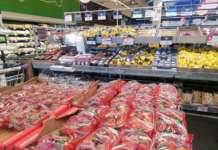The Italian pear-growing sector, for a long time an internationally recognized excellence, is struggling in a major crisis, determined by various structural elements (such as production fragmentation and lack of innovation), and aggravated by such new factors as the hostile climate and the announced phytosanitary tightening. All these elements make pear-growing less profitable (for four years companies have been without income and prices to the public are often lower than those paid to farmers) and therefore less attractive, as confirmed by the explants throughout the Italian territory.
Not surprisingly the national production of pears is constantly declining: from over 77,000 thousand tonnes in 2017 to 47,000 estimated for 2022 by ‘OI Pera’. Italy is the first European producer of pears, with over 30% of the total harvest. In Italy is concentrated over 95% of Abate Fetel pears in the world.
Another alarm bell concerns exports, which in the last five years heavily slumped with a -31% fall. Emilia Romagna, accounting for 70% of national production and 55% of Italian exports of pears (119 million Euros according to Ismea) suffered particularly the impact of this crisis. In this italian region pear is worth 35% of the gross saleable fruit production and employs 15,000 people. Pears were the first Emilia-Romagna fruit to receive PGI recognition, in 1998. Today PGI Pear from Emilia Romagna Consortium brings together 700 producers (out of the 4,600 present in the region), who represent over a quarter of the pear area for a potential harvest of over 100,000 tonnes.
A few months ago, the Consortium presented a plan to increase production, with the aim of bringing it to 60% of the regional one over a three-year period, and to relaunch consumption. Mauro Grossi, president of the Consortium, explained: ‘A due act for one of the important fruits in the Italian diet, which, despite its distinctive quality, has not yet benefited from a fair process of enhancement’. So, since the end of 2022, this fruit has been presented with a new sticker, the result of a restyling also designed to adapt it to co-branding operations with the main brands and premium private labels. The other new proposal is the segmentation of the product with the introduction on the market of the top quality, ‘Selection’, which involves some upgrades compared to the PGI standard product. We are talking about approximately 2,000 tonnes of PGI pears, identified by a special sticker and characterized by greater sweetness, distinctive calibre, and with pasty texture: a fruit to bite, also perfect for on-the-go consumption.
The relaunch of PGI pear was supported by an intense communication campaign that focused on TV, the press, and social channels. Another repositioning campaign, too, began in the second half of November, implemented in co-branding with PGI Pear from Emilia-Romagna: the one with Opera brand, which belongs to ‘Apo Conerpo’ business unit dedicated to pears. Adriano Aldrovandi, president of Opera, explained: ‘We aim at renewing attention to the brand after a short absence from communication channels, due to the difficulties of the last two years in terms of production’. The basic objective is to increase the profitability for producers through the requalification of the product and the aggregation of the supply chain, as confirmed by the development of the PGI product and the entry into the project of Opera, the AOP (Association of producers’ organizations, ‘Associazione di organizzazioni di produttori’, in Italian). This Association represents the commercial soul of PGI pear and brings together, pursuant to the EU Omnibus regulation, as many as 25 local companies, which were competitors and have become allies with the common goal of saving not only an economic sector, but an entire piece of society in Emilia Romagna.
The first objective of the AOP was to create a system with the Emilia Romagna Region, which allocated over 2.3 million Euros divided on several fronts: compensation for lost crops, support for varietal research and defence, as well as for agricultural supply chain contracts aimed at renewal in the field and technological adaptation, communication, and promotion of PGI pears in Italy and abroad.
So, how is the national market reacting? Aldrovandi answered: ‘In terms of sales, we need to widen our perspective and understand the general situation of our Country, influenced by the global geopolitical framework and by deep concerns on the economic and social front. In this context, pear, a fruit on average more expensive than other ones typical of the same period, such as apples and oranges, is suffering to some degree and is struggling to maintain the forecasted rhythms for the reduction of inventories. Those who choose pears this year, however, are rewarded: the fruits are on average smaller but, from the first bite, it will be possible to appreciate the good sugar content that the anomalous climatic conditions have determined’.
Spreafico, too, harvested smaller but sweeter fruits. This company is very active in the domain of pear growing, especially in the province of Bologna, where the group has invested by expanding its production areas. Simone Spreafico, managing director, explained: ‘Product requests and market sales are proceeding according to forecasts. In addition, sales of our Angys pear are in full swing starting from December, in line with suitable volumes, and we are expecting excellent market results, also because they are supported by important communication investments to encourage awareness and sale in both trade and consumer world’.
As for exports, we are increasingly subjected to global competition of players across the border, with the exception of very few varieties that are typical of our Country. Aldrovandi told: ‘It must also be taken into account that not all production areas have experienced the same production difficulties as Italy and this, also thanks to a different approach to prices by foreign competitors, puts us at a slight disadvantage’. Spreafico, for his part, pointed out the competition from the productions of the Netherlands, ‘however, our Abate Fetel and William pears are always well appreciated in Germany and France’.








